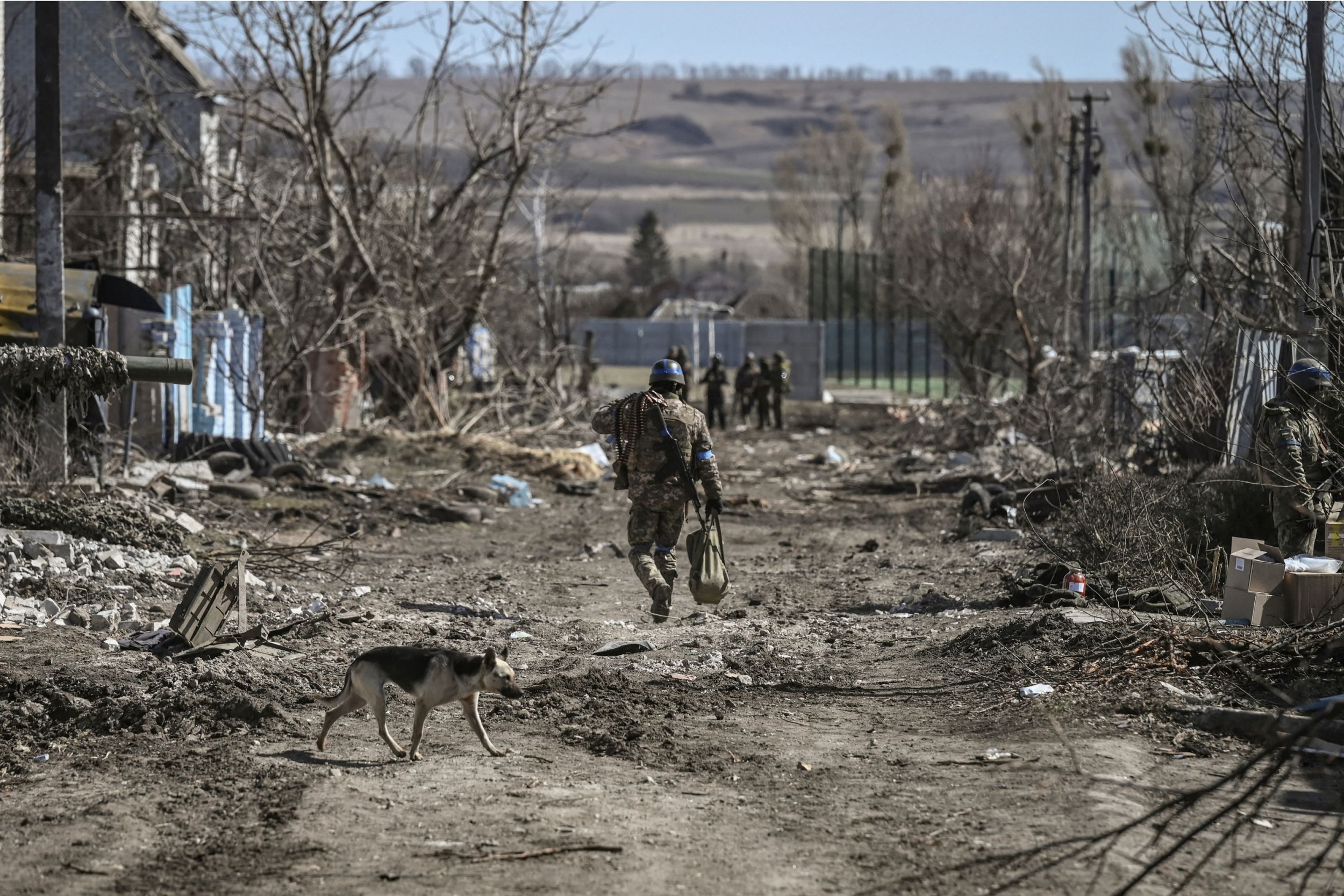Nato concessions could force Kremlin into ceasefire at Turkey summit, expert says

President Volodymyr Zelensky’s willingness to drop the pursuit of Ukraine’s Nato membership removes one of the “purported grounds for war”, ahead of key peace talks in Turkey on Tuesday, an expert says.
Marc Weller, the former UN mediation expert, said renouncing Nato membership is “not really a very substantive concession” but is symbolic and could make it more difficult for Moscow to resist calls for a ceasefire in the ongoing conflict.
“The offer is hedged. Instead of Nato membership, Ukraine is demanding more effective security guarantees than those offered in the ill-faded Budapest Memorandum of 1994. Russia had pledged never to use force against Ukraine in that document,” said Mr. Weller, who is also a professor of international law at the University of Cambridge.
“Also, the Kremlin justified its war in part with reference to the supposed encirclement of Russia by Nato. In removing the Nato issue from the equation, Ukraine is also removing one of the purported grounds for war, making it more difficult to resist the calls for a ceasefire.
“And President Zelensky’s first priority must be to end the violence, given the immense suffering of the population.”
Ukrainian officials have sought to downplay the significance of the peace talks, which are due to take place in Istanbul. The location was agreed upon after Turkish President Recep Tayyip Erdogan spoke to Vladimir Putin on Sunday.
Over the weekend, Mr. Zelensky said he was willing to discuss neutrality and offer security guarantees to Moscow to secure peace “without delay”.
Speaking to independent Russian journalists The Ukrainian President signaled that his country would be prepared to abandon its bid to join Nato, in an apparent concession to the Kremlin’s demands.
Moscow has long demanded that Ukraine drop any hope of joining Nato, claiming such a move would be a threat to Russian security.
Mr. Zelensky also mentioned some form of “compromise” involving the eastern Ukrainian territories known as the Donbas, although he did not suggest this might involve ceding land.
This terrorism includes parts of the Luhansk and Donetsk regions which are currently self-declared “republics” run by Russian-backed separatists.
He also insisted that the issue of neutrality would be put to Ukrainian voters in a referendum after Russian troops withdraw. In overnight comments, he added that “territorial integrity” remained Kyiv’s priority at the talks.
Other issues expected to be discussed at the peace talks include Russia’s demands for Ukrainian disarmament, “de-Nazification” of Ukraine’s government, and additional language rights for Russian speakers.
Professor Weller said: “De-nazification and disarmament are not real issues. Additional language rights for Russian speakers in Ukraine, as demanded by President Putin, are no major obstacle either.
“What is left is the demand to recognize Crimea as part of Russia, and to give in to the supposed independence of Luhansk and Donetsk, with the prospect of subsequent annexation by Moscow looming.
“This unmasks what remains of the Russian campaign as one aiming for the acquisition of territory by force.”
More on the Russia-Ukraine war
Officials began making their way to Istanbul on Monday. Mykhailo Podolyak, head of the Ukrainian delegation, said the start time depended on when all parties to the peace talks could get there.
“While we cannot and will not speak about progress at the talks, the fact that they continue to take place in person is important, of course,” said Kremlin spokesperson Dmitry Peskov.
It will be the first time in two weeks such talks will take place, after Sergei Lavrov and Dmytro Kuleba, the Russian and Ukrainian foreign ministers, met for discussions in the Turkish resort town of Antalya on 10 March, overseen by Turkish foreign minister Mevlüt Çavuşoğlu. That meeting did not yield concrete results, although discussions have been taking place in the background.
So far the negotiations have failed to make progress on ending the war that has killed thousands and driven more than 10 million Ukrainians from their homes – with almost four million fleeing abroad.
Since then, both sides have met via video link, rather than face to face, and have publicly discussed progress on a diplomatic solution. However, neither has budged over Russia’s territorial demands, including Crimea, which Moscow seized and annexed in 2014, and the Donbas region, which Moscow says Kyiv cede to Russian-backed separatists.
“I don’t think there will be any breakthrough on the main issues,” Ukrainian interior ministry adviser Vadym Denysenko said on Monday.
However, Ihor Zhovkva, deputy head of Mr. Zelensky’s office, relayed optimism that Turkey could offer Ukraine security guarantees as part of any deal with Russia to end the war. “Turkey is among those countries that could become guarantors of our security in the future,” he said.
Mr. Lavrov said on Monday that Mr. Putin and Mr. Zelensky could meet – something the Ukrainian president has been demanding repeatedly for weeks – but only after the two sides are closer to agreeing on key issues, saying a meeting now would be “counterproductive”.
“The meeting is necessary once we have clarity regarding solutions on all key issues,” Mr. Lavrov said in an interview with Serbian media.
On the forthcoming talks in Turkey, he said he would like negotiations “to be fruitful”.
Who’s who in the peace talks
Recep Tayyip Erdogan
The Turkish President has offered to mediate between the two sides and host talks since the start of the conflict. He told Mr Putin in a telephone call on Sunday that a ceasefire and better humanitarian conditions were needed, his office said in a statement. Turkey borders Ukraine and Russia in the Black Sea, and has good ties with both countries.
Dmytro Kuleba
Ukraine’s foreign minister described peace negotiations as “very difficult” last week, saying his delegation has taken a strong position in insisting a ceasefire, security guarantees and the territorial integrity of Ukraine. He also said there was “no consensus” with Russia on key points.
Sergei Lavrov
The Russian foreign minister said both sides could potentially reach an agreement at the talks, as Moscow believed Nato had heard some of its security concerns, Russian state news agency Tass reported. He listed points that Russia plans to raise, such as Ukraine’s demilitarisation and “denazification”.
He dismissed the possibility of top-level talks between Mr Putin and Mr Zelensky, telling Serbian media on Monday that Ukraine only wants to “imitate talks” while Russia needs specific results that could then be secured by the countries’ leaders.
David Arakhamia
The representative of the Ukrainian delegation said both sides would arrive in Istanbul late on Monday night, with talks likely to begin at 10am the following day, and expected to last until Wednesday.
Roman Abramovich
The Chelsea football club owner has reportedly been acting as a “peacemaker” as he bids to avoid the impact of Western sanctions in Turkey. He has shuttled between Istanbul, Moscow and Kyiv to relay messages between Mr Putin and Mr Zelensky, according to the Times. After he handed Mr Putin a handwritten note by Mr Zelensky outlining Ukraine’s peace terms, the Russian leader allegedly told the oligarch “tell him I will thrash them”.
Mr Abramovich and a team of Ukrainian peace negotiators, including Ukrainian MP Rustem Umerov, were targeted in a suspected poisoning by “hardliners in Moscow” following a meeting in Kyiv earlier this month, the Wall Street Journal reported.
Rustem Umerov
The Crimean Tatar, a former businessman who speaks both Turkish and Russian, led a Ukrainian delegation in earlier ceasefire talks with Moscow in Belarus, but no agreement was reached. He has held meetings with Mr Abramovich at hotels in Istanbul and accompanied him on a visit to Kyiv where the Russian oligarch met Mr Zelensky, The Times reported.
Vladimir Medinsky
Moscow’s chief negotiator has headed Russia’s delegation at in-person talks in Belarus and has continued to lead ongoing negotiations by video link, the Kremlin said. Last week, he said Ukraine was to blame for the talks dragging on and that no progress has been made on the main political issues.



